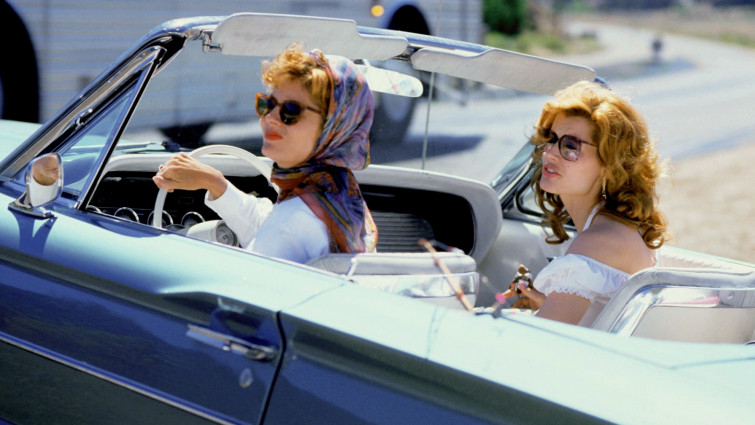

Member review

Thelma & Louise
Two female friends take a road-trip from their dreary lives for the weekend and plunge into wild adventure, in a film prompting much...
Certificate
Duration124 mins
Review by
- Liz, 17
- 6 reviews
Review by Liz, 17
Thelma & Louise is a masterpiece that strikes the perfect balance between entertainment, great filmmaking and sociopolitical resonance. On the surface it is the comedic, American road-trip flick, steering us through the eventful journey of two daring women on the run, but at its deepest it is a film that provides identification, liberation and empowerment to at least half the human race. The two heroines defy the stereotypical place of women in film within the first few minutes, their character development being complex, intriguing and continuous throughout. A contrast between the two of them is established instantly, the dutiful housewife and the flustered waitress who, at the start, make surprising friends. One thing they share, however, is an oppressive setting - the cluttered home kitchen and busy, smoky diner represent the constraints that initially confine the two women. What moves me is how their friendship endures, despite the change to their environments and the semi-reversal of their roles between them. Thelma abandons her insecurities and finds her strength on the open roads, while the southern sun thaws Louise's tough exterior, revealing a driven woman and loyal companion. When discussing Thelma & Louise, it is impossible not to raise the issue of feminism. Nowadays, the F word is more often linked to feminazi fascism instead of equality between the sexes, which makes this film refreshingly revolutionary in its ability to present the liberation of women, without denouncing all mankind. The policeman who tries to save the heroines, although displaying the classically paternal instinct of protection, is portrayed in a sympathetic light which helps show the film isn't trying to be a misandristic kick between the legs. The comic portrayal of Thelma's husband not only offers us a few chuckles, but also prevents the film from making a sweeping generalisation. To quote Geena Davis (Thelma) herself, if a male audience feel threatened by the women presented in the film, they're "identifying with the wrong character[s]". I can well understand why some would criticise those who label the film 'feminist', due to the aggressive and criminal tendencies that the heroines have to resort to. But while being robbers and even killers, they are never presented as condemnable. One example of this is when the police question a waitress at the scene where Louise has previously shot a man, and the waitress insists the woman she served that night could never have pulled a trigger. I prefer to interpret Thelma and Louise's lawbreaking as an extension of their liberation, after all, who originally determined and enforced the law? Unfortunate answer: not women. What I like the most about the empowerment this film exhibits is that it doesn’t feel painstakingly forced or deliberate. Callie Khouri describes herself as a feminist, but never was Thelma & Louise written to be a feminist device. This is a film that’s still a film, designed to engage and entertain. It’s clever in how, as I said from the beginning, it achieves this balance. I loved watching Thelma and Louise’s characters develop as they drove through beautiful scenery, swapping their glamorous lipsticks and movie-star sunglasses for the denim they wore yesterday. The traits of stereotypical women in film are abandoned over the course of two hours, but the one thing that doesn’t diminish is their sisterhood. I teared up in the film’s final moments, because Khouri taps into some part of the female psyche that makes us so emotionally attached to her renegade heroines. The only downside of this film, is that one can never be made of quite the same calibre.